To start Wicca as a beginner, read a few beginner-friendly books, learn the basic beliefs, and take things slowly. Spend time in nature, practice simple meditation, and keep a journal of what you learn. Create a small space at home for reflection or ritual, and begin with easy practices like observing the moon or lighting a candle with intention. Let your practice grow naturally as you discover what feels right to you.
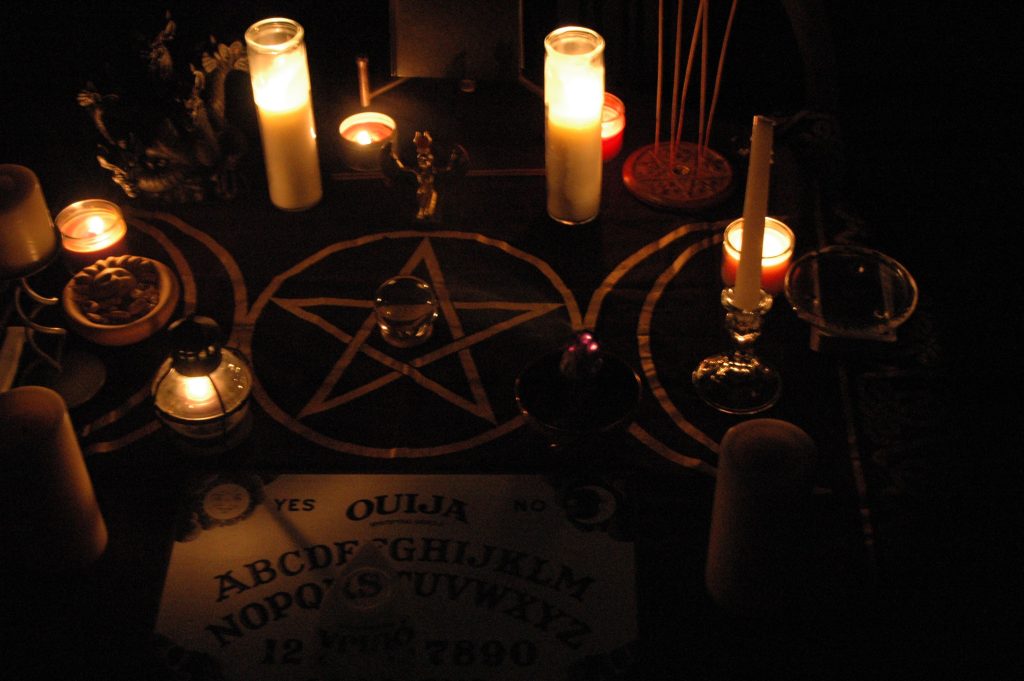
As you step into the realm tailored of Wicca for beginners, this guide is artfully designed to lay the cornerstone for your voyage into a captivating synthesis of ancient wisdom and modern discovery. In a world propelled by relentless technological strides and urban urgencies, an escalating number of seekers are uncovering solace and renewed connections through the realms of spirituality. For those who are new to the Wiccan path, this journey offers a unique blend of age-old traditions and contemporary beliefs, all intertwined with a profound respect for nature, the enchantment of magic, and the cultivation of personal empowerment.
What is Wicca?
Wicca is a modern, nature-based religion that centres on the idea that the Earth and all living things are sacred. Most Wiccans honor both a Goddess and a God, seeing divinity as balanced and connected to nature. They celebrate seasonal festivals, called Sabbats, and often hold rituals during the full moon. A key part of Wiccan belief is the principle of harming no one and living in a kind, respectful way. Overall, Wicca is a peaceful spiritual path focused on harmony, balance, and the natural world.
Here are some fundamental aspects of Wicca that beginners should know:
- Nature-Centric Spirituality: Wicca for beginners is deeply rooted in nature worship. Practitioners revere the Earth and its cycles, aligning their rituals and celebrations with the changing seasons, lunar phases, and natural elements. This nature-centric approach fosters a profound sense of harmony and interconnectedness with the world around them.
- Polytheism and Deity: Wicca for beginners encompasses a diverse range of beliefs regarding deities. Many Wiccans honor a god and goddess, often associated with nature and fertility. However, the specific gods and goddesses, as well as the ways they are perceived, can vary widely among different traditions and individuals.
- Magic and Ritual: The practice of magic, or “magick” in Wiccan terminology, is a fundamental aspect of the religion. Wiccans believe in harnessing natural energies to bring about positive change in their lives and the world. Rituals and spellwork often involve the use of symbolic tools, such as candles, crystals, herbs, and incense, to focus intention and energy.
- Witchcraft and Empowerment: Wicca for beginners is often associated with witchcraft, and many Wiccans identify as witches. Witchcraft within the Wiccan context is not about malevolent sorcery; instead, it emphasizes personal empowerment, self-discovery, and ethical practices. Wiccans use magic to enhance their lives, promote healing, and manifest their intentions.
- The Wheel of the Year: Wicca follows an annual cycle known as the Wheel of the Year, consisting of eight Sabbats or seasonal celebrations. These celebrations mark significant points in the agricultural calendar, such as the equinoxes, solstices, and cross-quarter days. Each Sabbat has its own themes, rituals, and associated activities.
- Solitary and Covens: Wiccan practice can be solitary or group-oriented. Some beginners choose to study and practice on their own, while others join covens or small groups led by experienced practitioners. Covens offer a supportive community for learning, rituals, and shared magical experiences.
- Ethics and Values: Wicca for beginners upholds a moral code centered around the principle “An’ ye harm none, do what ye will.” This means that Wiccans strive to avoid causing harm to others or interfering with their free will. Respect for others, the environment, and oneself is a core value within the Wiccan community.
- Personal Exploration: Wicca for beginners encourages a personal exploration of spirituality and a connection to the divine that resonates with the individual practitioner. As a beginner, you have the freedom to explore different aspects of Wicca, experiment with rituals, and gradually develop your own unique path within the broader framework of the tradition.
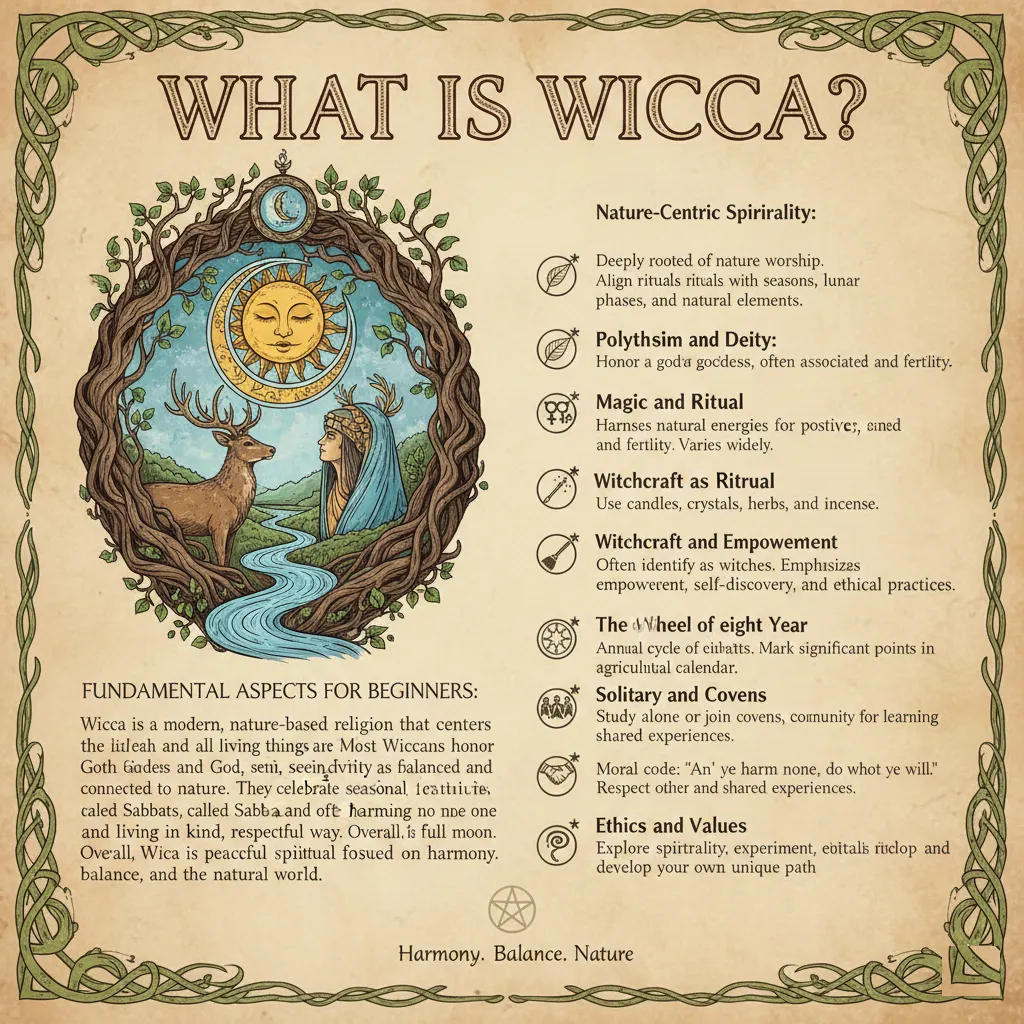
What tools do Wiccans use?
Wiccans use a few simple ritual tools, mostly symbolic and not meant to be dangerous. Here are the most common ones:
- Athame – A ritual knife (usually not sharp) used to direct energy, not to cut things.
- Wand – Also used for guiding energy, often made of wood.
- Chalice – A cup that represents water and the feminine aspect.
- Pentacle – A flat disc with a five-pointed star, symbolizing earth and protection.
- Cauldron – A small pot used for burning herbs, mixing ingredients, or symbolic purposes.
- Candles – Used for light, focus, and representing different intentions.
- Crystals and herbs – For meditation, healing, or symbolic meaning.
Core Beliefs and Practices of Wicca for Beginners
Let’s delve further into the core beliefs and practices of Wicca for beginners. These foundational elements form the heart of the Wiccan tradition and offer a framework for spiritual exploration and growth:
1. Nature-Centered Spirituality: Central to Wicca is a deep reverence for the natural world. Wiccans believe that the Earth and all its elements are sacred and interconnected. They celebrate the cycles of nature, such as the changing seasons, lunar phases, and the ebb and flow of life.
2. Deities and Dualism: Many Wiccans honor a god and goddess, often representing masculine and feminine energies respectively. These deities can be understood as archetypes or personifications of natural forces. Wicca for beginners embraces a balanced duality, recognizing the importance of both light and darkness, creation and destruction, as essential aspects of the universe.
3. The Threefold Law and Ethics: The Threefold Law is a common ethical principle in Wicca, stating that whatever energy one puts out into the world—whether positive or negative—will return threefold. This encourages practitioners to act with responsibility, kindness, and mindfulness, emphasizing the importance of treating others and the environment with respect.
4. Magic and Spellwork: Magic, or “magick,” is a key component of Wiccan practice. It involves working with energy to manifest positive change. Spells are crafted rituals that harness intention, visualization, and symbolic tools to influence the desired outcome. Beginners often start with simple spells for personal growth, protection, or enhancing daily life.
5. Ritual and Worship: Rituals in Wicca are ceremonies performed to connect with the divine, honor deities, and celebrate natural cycles. These rituals often involve casting circles, calling upon the quarters (representing the four cardinal directions), and inviting the presence of gods and goddesses. They create a sacred space for magical workings and meditation.
7. Book of Shadows: A Book of Shadows is a personal journal or grimoire where Wiccans record their rituals, spells, insights, and experiences. It serves as a guide for their spiritual journey and a repository of wisdom passed down from one’s own practice and teachings.
7. Book of Shadows: A Book of Shadows is a personal journal or grimoire where Wiccans record their rituals, spells, insights, and experiences. It serves as a guide for their spiritual journey and a repository of wisdom passed down from one’s own practice and teachings.
8. Esbats and Sabbats: Esbats are rituals held during the phases of the moon, often focusing on introspection, meditation, and personal growth. Sabbats, on the other hand, mark the seasonal festivals that celebrate the cycles of nature. The eight Sabbats include Samhain, Yule, Imbolc, Ostara, Beltane, Litha, Lammas, and Mabon.
9. Personal Empowerment: Wicca emphasizes individual spiritual growth and empowerment. Practitioners are encouraged to learn, explore, and adapt the tradition to suit their personal beliefs and needs. Wicca acknowledges that each person’s journey is unique, and there’s no single “right” way to practice.
As a beginner, remember that Wicca is a path of continuous learning and discovery. Take the time to absorb these core beliefs and practices, and allow your own experiences and intuition to guide you. It’s a journey that encourages personal growth, self-awareness, and a deeper connection to the natural world and the mysteries it holds.
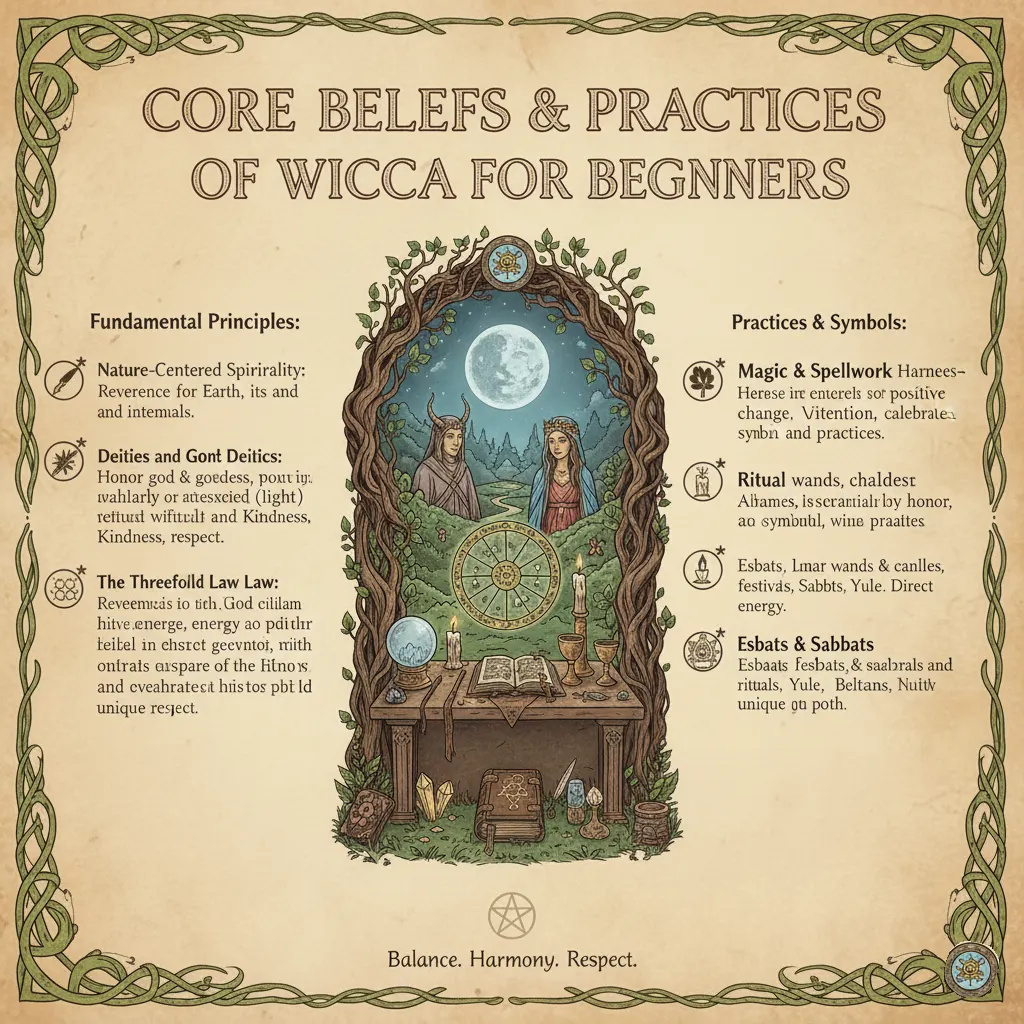
Getting Started In Wicca for Beginners
Certainly, getting started in Wicca for beginners involves taking deliberate steps to lay a solid foundation for your journey into this spiritual path. Here’s a comprehensive guide to help you embark on your Wiccan exploration:
- Research and Education: Begin by immersing yourself in Wicca for beginners literature. Reading books, articles, and reputable online resources written by experienced practitioners will give you a thorough understanding of the history, beliefs, and practices of Wicca. Recommended beginner books include “Wicca: A Guide for the Solitary Practitioner” by Scott Cunningham and “The Witch’s Book of Shadows” by Phyllis Curott.
- Self-Reflection: Take time to reflect on your personal beliefs and what draws you to Wicca. Consider your spiritual journey so far, your connection with nature, and your desire for personal growth. This self-awareness will guide your path and help you shape your practice.
- Connecting with Nature: Spend time outdoors to connect with the natural world. Observe the changing seasons, take walks in nature, and meditate under the open sky. Developing a strong connection to the Earth is a central aspect of Wicca for beginners and non beginners.
- Setting Up an Altar: Create a dedicated space for your Wiccan practice—an altar. Choose a quiet and peaceful area where you can place symbolic tools like candles, incense, crystals, and statues representing deities or elements. Your altar will serve as a focal point for rituals and meditation.
- Learning Meditation and Visualization: Meditation and visualization are essential skills in Wiccan practice . These techniques help you focus your mind, enhance your intuition, and connect with the energies around you. Regular meditation sessions will deepen your spiritual experiences.
- Observing Esbats and Sabbats: Start participating in Esbats (moon rituals) and Sabbats (seasonal festivals) to align yourself with the cycles of nature. Research the meanings and practices associated with each celebration and explore how you can incorporate them into your own rituals.
- Keeping a Book of Shadows: As one of the first steps in wicca for beginners you need to begin your own Book of Shadows, a personal journal where you record your experiences, thoughts, spells, rituals, and insights. This book will become a valuable resource and a reflection of your spiritual journey.
- Experimenting with Magic: Among other advice given in wicca for beginners you should start with simple spells and rituals that resonate with your intentions. Choose spells that focus on personal growth, protection, and positive change. Remember to follow ethical guidelines and focus on intentions that harm none.
- Finding a Community: Consider joining local Wiccan groups, online forums, or social media communities that focuse on wicca for beginners therefore you can connect with experienced practitioners. Engaging with a community provides you with insights, guidance, and the opportunity to share your experiences.
- Embracing Personal Growth: Wicca encourages self-improvement and personal empowerment. Explore topics like divination (e.g., tarot reading), dream interpretation, and energy work to enhance your practice and your understanding of yourself.
- Patience and Adaptation: Remember that Wicca is a personal journey, and there’s no rush to master everything. Allow yourself to adapt and evolve as you learn and grow. Your practice will naturally transform over time.
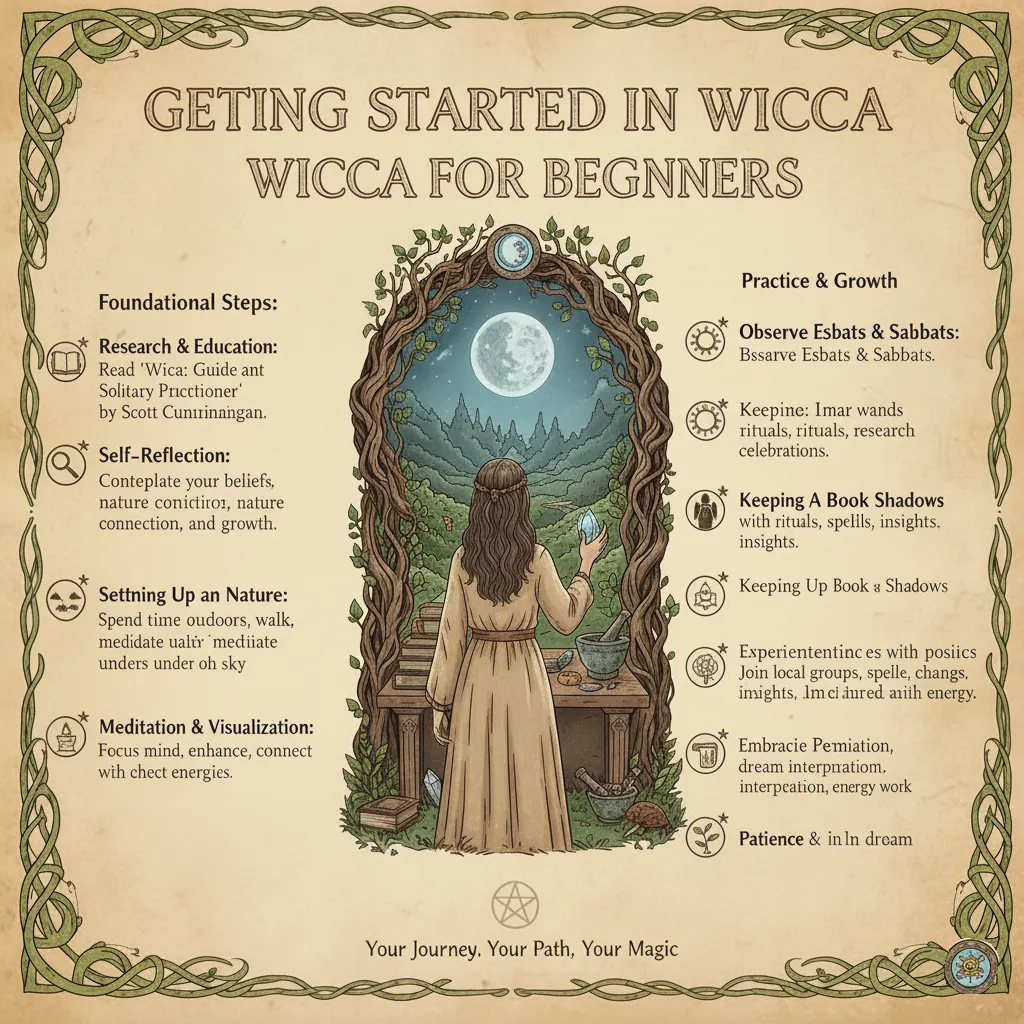
By embracing Wicca for beginners with curiosity, respect, and an open heart, you lay the groundwork for a robust foundation. This sets you on a rewarding path of self-discovery, forging connections with nature, and delving into the realm of magical arts. As your studies and experiences unfold, your comprehension of Wicca will naturally deepen, revealing the individual path that resonates most profoundly with you.
Other Resources to Learn More About Wicca for Beginners
There are numerous resources available to help you learn more about Wicca for beginners. Whether you prefer books, online materials, or local groups, here are some valuable resources to consider:
1. Books: There are many books about wicca for beginners. Some highly recommended titles include:
- “Wicca: A Guide for the Solitary Practitioner” by Scott Cunningham
- “The Complete Idiot’s Guide to Wicca and Witchcraft” by Denise Zimmermann and Katherine Gleason
- “The Modern Witchcraft Spell Book” by Skye Alexander
- “Wicca: A Modern Guide to Witchcraft and Magick” by Harmony Nice
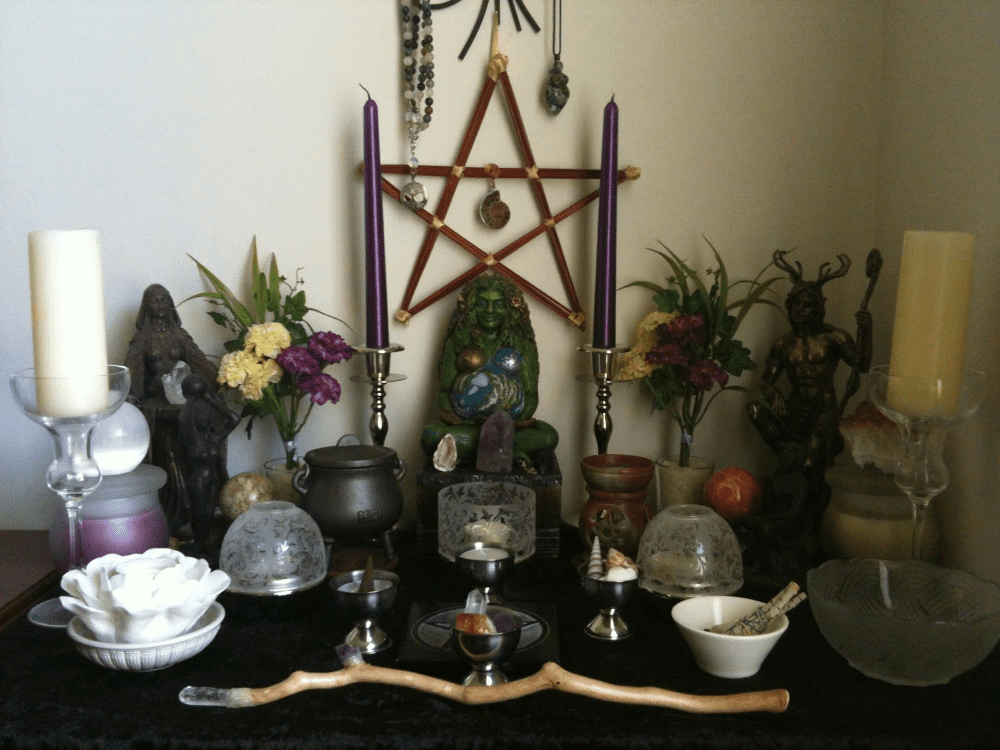
2. Websites and Online Communities: There are numerous websites, blogs, and online forums dedicated to Wicca for beginners. These platforms offer articles, discussions, and resources to help beginners learn and connect with others in the community. Some popular online resources include:
- Witchvox (witchvox.com)
- The Cauldron (thecauldron.net)
- Reddit’s r/Wicca and r/Witchcraft subreddits
- The Witches’ Voice (witchesvoice.com)
3. YouTube Channels and Videos: YouTube hosts a variety of channels dedicated to Wicca for beginners, offering tutorials, discussions, and insights for beginners. Some channels to explore include:
- Harmony Nice
- The Witch of Wonderlust
- The Green Witch
- Witch on Fire
4. Local Classes and Workshops: Check if there are any local metaphysical or pagan shops in your area that offer classes or workshops on Wicca for beginners. Attending these in-person sessions can provide you with hands-on experience, guidance, and opportunities to connect with like-minded individuals.
5. Social Media Groups: Social media platforms like Facebook and Instagram host groups and pages dedicated to Wicca and witchcraft. These groups can be great places to ask questions, share experiences, and learn from others.
6. Podcasts: Podcasts are another accessible way to learn about Wicca for beginners and related topics. Some podcasts that cater to beginners include:
- “The Witch Wave” by Pam Grossman
- “New World Witchery” by Cory and Laine
- “The Fat Feminist Witch” by Paige Vanderbeck
7. Local Pagan and Wiccan Groups: If you’re comfortable, consider joining local pagan or Wiccan groups in your area. These groups often organize events, workshops, and meetups where you can learn from experienced practitioners and build a sense of community.
When exploring these resources, keep in mind that Wicca is a diverse and evolving practice. Different authors, traditions, and perspectives exist within the Wiccan community, so it’s beneficial to explore multiple sources to gain a well-rounded understanding. As you progress on your Wiccan journey, remember that personal experience and intuition play a significant role in shaping your path.
Common Wiccan Spells to Get Started With
Here are a few simple spells if you’re interested in Wicca for beginners. Remember to approach these spells with clear intentions, positivity, and ethical considerations:
Ingredients:
- White candle
- Salt
Instructions:
- Light the white candle.
- Sprinkle a line of salt in front of the candle, envisioning it forming a protective boundary.
- Repeat a simple chant like: “By the power of light and earth, protection now surrounds me.”
- Visualize a glowing shield of energy forming around you or your space, keeping out negative influences.
- Let the candle burn safely until it extinguishes.
2. Self-Confidence Spell: This spell can help boost your self-esteem and confidence.
Ingredients:
- Yellow candle
- Mirror
Instructions:
- Light the yellow candle.
- Stand in front of the mirror and look into your own eyes.
- Repeat affirmations like: “I am confident. I am capable. I believe in myself.”
- Visualize a warm, radiant energy emanating from the candle and filling you with self-assurance.
- Blow out the candle, knowing that its energy continues to support your confidence.
3. Attracting Abundance Spell: Use this spell to attract positive energy and abundance into your life.
Ingredients:
- Green candle
- Small bowl of salt
- Small bowl of rice
Instructions:
- Light the green candle.
- Place the bowl of salt and the bowl of rice next to the candle.
- Hold your hands over the bowls and say: “By the power of earth and sea, abundance flows to me.”
- Visualize a stream of prosperity and positive opportunities coming into your life.
- Leave the candle to burn for a while as you focus on your intention.
- Extinguish the candle and keep the salt and rice in a place where you can see them daily as a reminder of your goal.
4. Healing Spell: Another spell you can learn if you’re interested in Wicca for beginners is healing spell. Use this spell to promote physical or emotional healing.
Ingredients:
- Blue candle
- Healing crystal (e.g., amethyst, rose quartz)
- Fresh flowers or herbs (e.g., lavender, rosemary)
Instructions:
- Light the blue candle.
- Hold the healing crystal in your hands and focus on its energy.
- Say: “With the light of this flame, healing energy I claim.”
- Place the crystal next to the candle and arrange the flowers or herbs around it.
- Visualize a soothing, healing light enveloping you or the person you’re casting the spell for.
- Let the candle burn down safely or extinguish it while focusing on the healing energy being released.
Remember that intention, focus, and personal connection to the spell are key factors in its effectiveness. Be patient and give your spells time to manifest. As a beginner, it’s important to start with simple spells like these before progressing to more complex magical practices. Always keep in mind the ethical considerations of Wicca, focusing on intentions that harm none and respecting the free will of others.
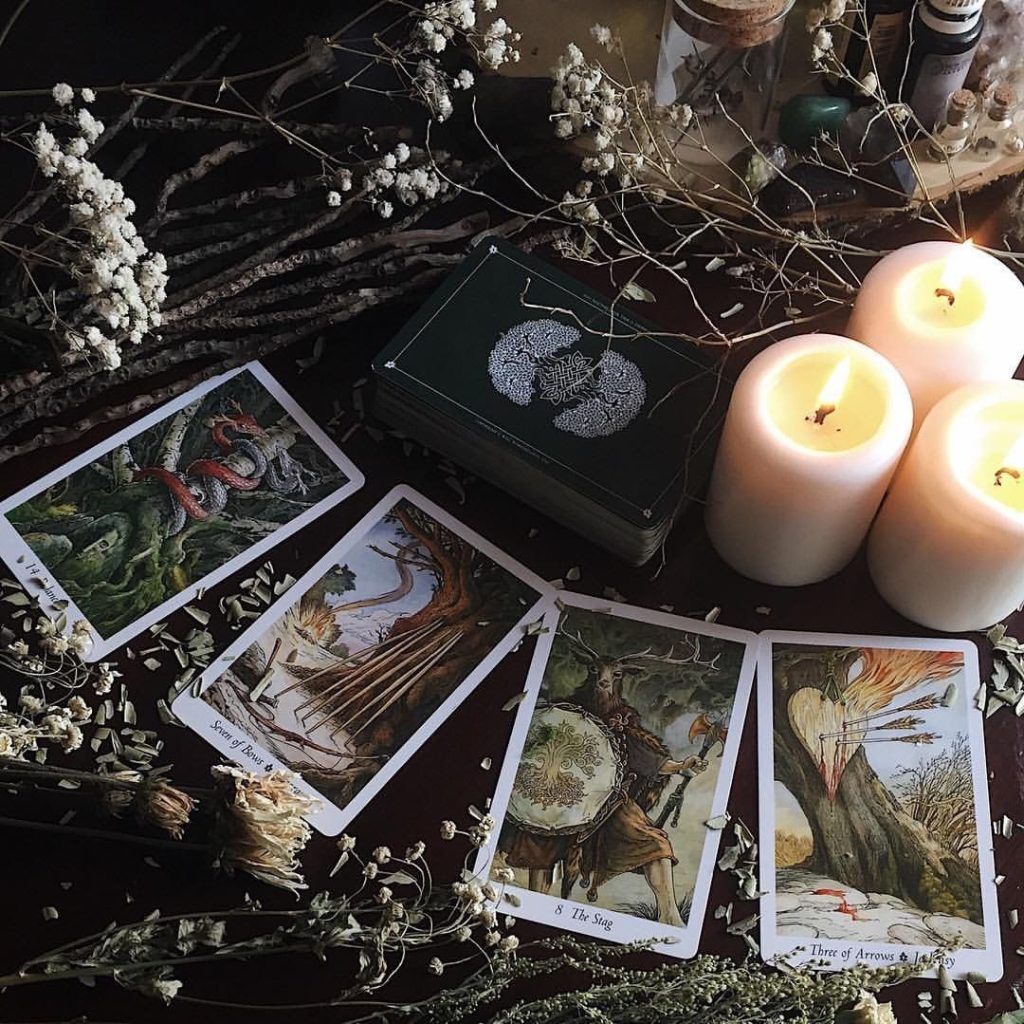
Conclusion
As you delve into Wicca for beginners, remember that it’s a deeply personal journey. There is no one-size-fits-all approach, and your beliefs and practices may evolve over time. Seek guidance from experienced practitioners, attend gatherings or online forums, and remain open to new perspectives.
Wicca offers a spiritual path that fosters a connection to nature, self-empowerment, and a sense of wonder. Whether you’re drawn to its rituals, the exploration of magic, or the reverence for the divine within all things, Wicca welcomes beginners with an open heart and a desire for spiritual growth.

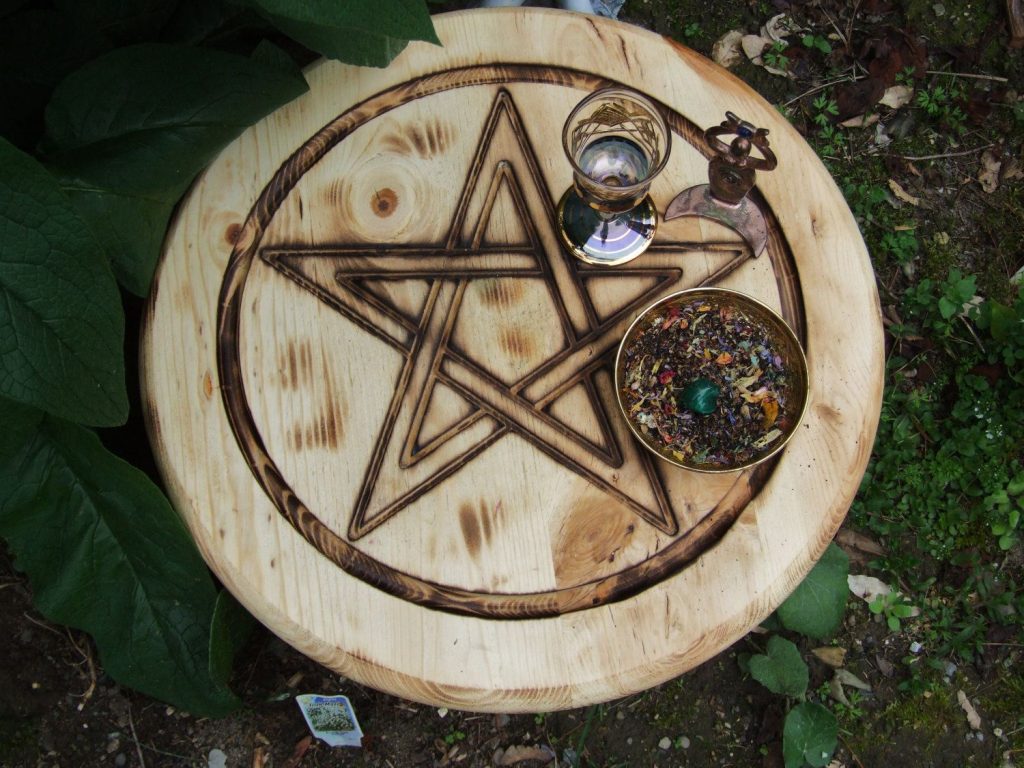
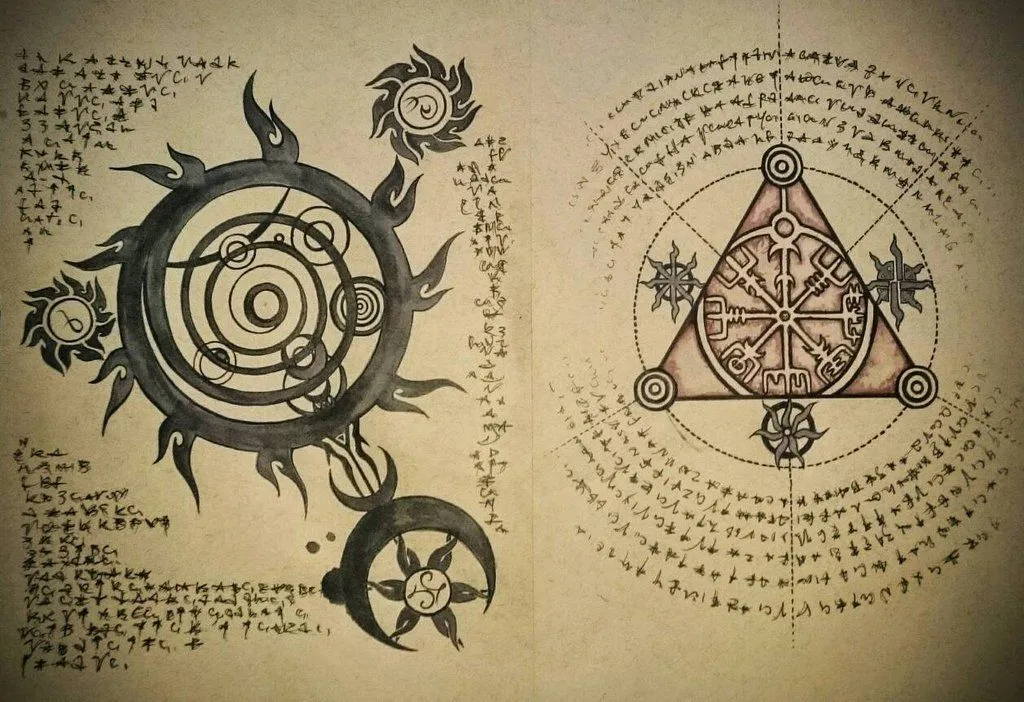


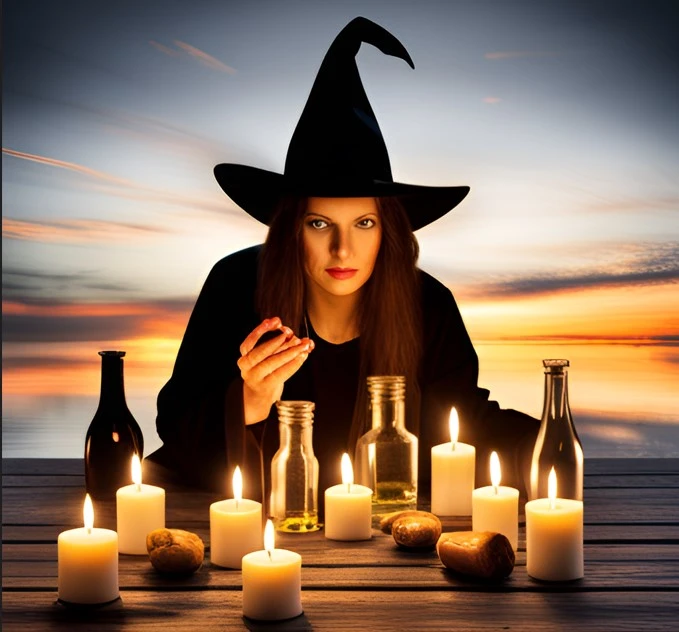
Pingback: The Mysterious World of Hexes and Curses: A Deep Dive into Dark Magic - Witch symbols